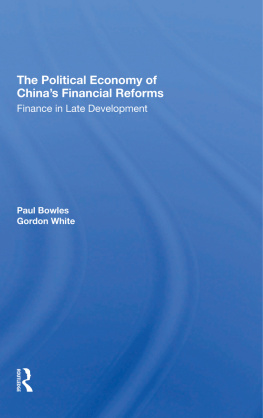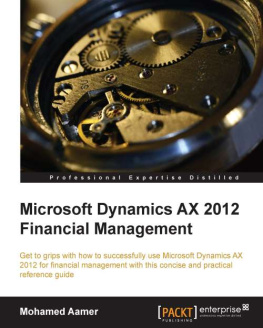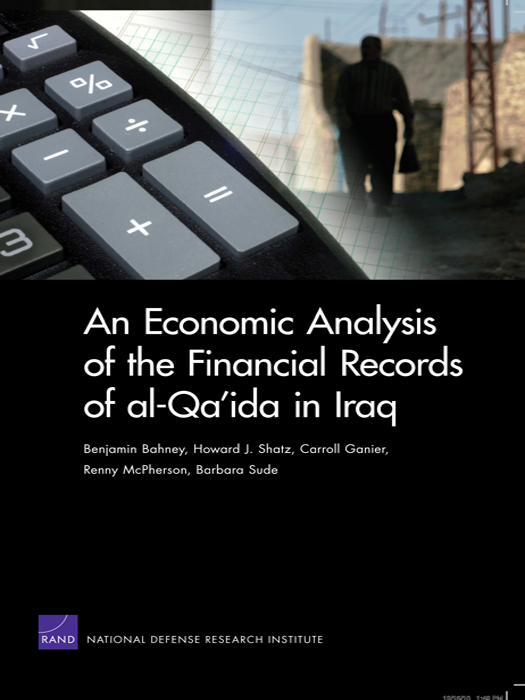An Economic Analysis
of the Financial Records
of al-Qaida in Iraq

Benjamin Bahney, Howard J. Shatz, Carroll Ganier,
Renny McPherson, Barbara Sude
With Sara Beth Elson, Ghassan Schbley
Prepared for the Office of the Secretary of Defense
Approved for public release; distribution unlimited
 NATIONAL DEFENSE RESEARCH INSTITUTE
NATIONAL DEFENSE RESEARCH INSTITUTE
The research described in this report was prepared for the Office of the Secretary of Defense (OSD). The research was conducted in the RAND National Defense Research Institute, a federally funded research and development center sponsored by OSD, the Joint Staff, the Unified Combatant Commands, the Navy, the Marine Corps, the defense agencies, and the defense Intelligence Community under Contract W74V8H-06-C-0002.
Library of Congress Cataloging-in-Publication Data
An economic analysis of the financial records of al-Qaida in Iraq / Benjamin Bahney [et al.].
p. cm.
Includes bibliographical references.
ISBN 978-0-8330-5039-7 (pbk. : alk. paper)
1. Qaida (Organization)Finance. 2. TerrorismIraqFinance. 3. TerrorismFinance. I. Bahney, Benjamin.
HV6433.I722Q357 2010
363.32509567dc22
2010028999
The RAND Corporation is a nonprofit institution that helps improve policy and decisionmaking through research and analysis. RANDs publications do not necessarily reflect the opinions of its research clients and sponsors.
RAND is a registered trademark.
Cover image (right) by AP Photo / Petros Giannakouris.
Copyright 2010 RAND Corporation
Permission is given to duplicate this document for personal use only, as long as it is unaltered and complete. Copies may not be duplicated for commercial purposes. Unauthorized posting of RAND documents to a non-RAND website is prohibited. RAND documents are protected under copyright law. For information on reprint and linking permissions, please visit the RAND permissions page (http://www.rand.org/publications/permissions.html).
Published 2010 by the RAND Corporation
1776 Main Street, P.O. Box 2138, Santa Monica, CA 90407-2138
1200 South Hayes Street, Arlington, VA 22202-5050
4570 Fifth Avenue, Suite 600, Pittsburgh, PA 15213-2665
RAND URL: http://www.rand.org/
To order RAND documents or to obtain additional information, contact
Distribution Services: Telephone: (310) 451-7002;
Fax: (310) 451-6915; Email:
eISBN: 9780833050526
Preface
This monograph conducts a series of economic analyses on two collections of documents detailing the administration of al-Qaida in Iraq (AQI) during 2005 and 2006 in Anbar province, Iraq. The documents contain information on the groups finances, payrolls, and organization.
The records show that AQI was a bureaucratic, hierarchical organization that exercised tight financial control over its largely criminally derived revenue streams. Using attack reports and AQIs spending data, we find that attacks statistically increased at a rate of one per every $2,700 sent by the provincial administration to a sector group within the province, suggesting that AQI paid not only for materiel but also for important expenses related to organizational sustainment, such as compensation and rents. AQI members were paid less and simultaneously faced a much greater risk of death than the general Anbar population, which suggests that financial rewards were not a primary reason for joining the group. Our findings imply that financial interdiction is one useful tool for slowing and disrupting militant attacks, but that neither interdiction nor material demobilization incentives on their own will be effective in ending a militant group.
This research was conducted within the Intelligence Policy Center of the RAND National Defense Research Institute, a federally funded research and development center sponsored by the Office of the Secretary of Defense, the Joint Staff, the Unified Combatant Commands, the Navy, the Marine Corps, the defense agencies, and the defense Intelligence Community.
For more information on the RAND Intelligence Policy Center, see http://www.rand.org/nsrd/about/intel.html, or contact the director (contact information is provided on the web page).
Contents
Figures
Tables
Summary
Terrorist and insurgent groups, both of which may be termed militant groups, are economic actors: They have a fundamental need to mobilize resources. However, there has been relatively little research about the economic and financial decisionmaking of such groups based on actual financial records. With U.S., North Atlantic Treaty Organization, and other allied troops and governments engaged in counterinsurgency and counterterrorism operations, such research could help mitigate the threats posed by these groups by improving our understanding of their financial decisionmaking.
This monograph analyzes the finances of the militant group al-Qaida in Iraq (AQI) in Anbar province during 2005 and 2006, at the peak of the groups power and influence. We draw on captured financial records that recorded the daily financial transactions of both one specific sector within Anbar province and the AQI provincial administration. To our knowledge, this monograph offers one of the most comprehensive assessments of the financial operations of AQI or any other contemporary Islamic militant group.
Key Findings
AQI was a hierarchical organization with decentralized decisionmaking. The memos and financial ledgers in this collection of documents clearly indicate that AQI in Anbar province had a hierarchically organized system of financing and administration, with established bureaucratic relationships and rules. Although a hierarchy of administrative units collected reporting from the field, controlled the allocation of resources, and broadly administered the policies and procedures of AQI in Anbar, this arrangement is not inconsistent with the idea that a network of local commanders implemented these policies and made their own tactical decisions in a decentralized manner.
AQI in Anbar was profitable enough to send substantial revenues out of the province in 2006. News reports in 2006 and 2007 indicated that AQI was profitable enough to be financially self-sufficient, and that it was sending excess revenues to al-Qaida senior leaders in Pakistan. There was no explicit record of transfers to Pakistan in these documents, but there was evidence to suggest that the Anbar chief administrative officer, known as the administrative emir, exported revenues to other provinces in Iraq or to other countries.
AQI relied on extortion, theft, and black market sales to fund its operations in Anbar. AQI relied to a great extent on simple theft and resale, primarily of high-value items such as generators and cars, from Shia transiting Anbar province and people cooperating with Coalition Forces (CF). The group increased its reliance on the threat of violence to generate revenue in mid-2006, which we believe helped to turn influential tribes against it and toward collaboration with CF.
AQI needed large, regular revenue sources to fund its operations, but its administrative leaders did not hold much cash on hand.










 NATIONAL DEFENSE RESEARCH INSTITUTE
NATIONAL DEFENSE RESEARCH INSTITUTE